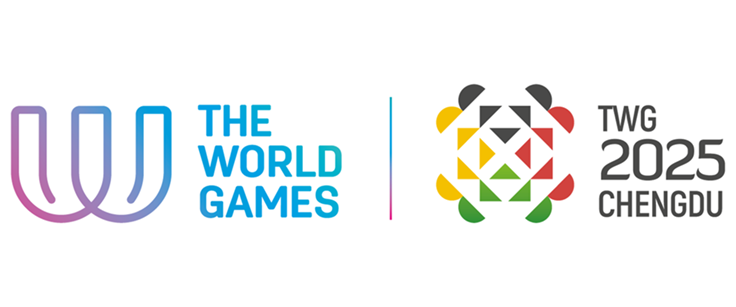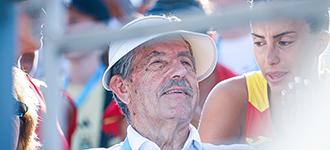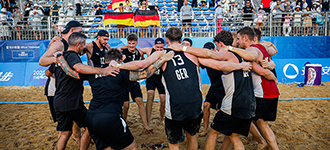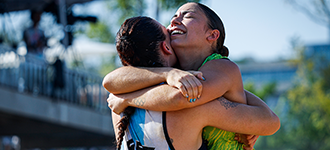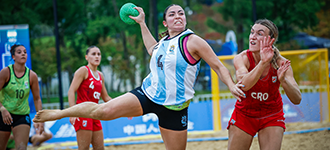“When I'm in the court, I forget everything” – Brazil’s magician Bruno still casting spells 20 years on
09 Aug. 2025
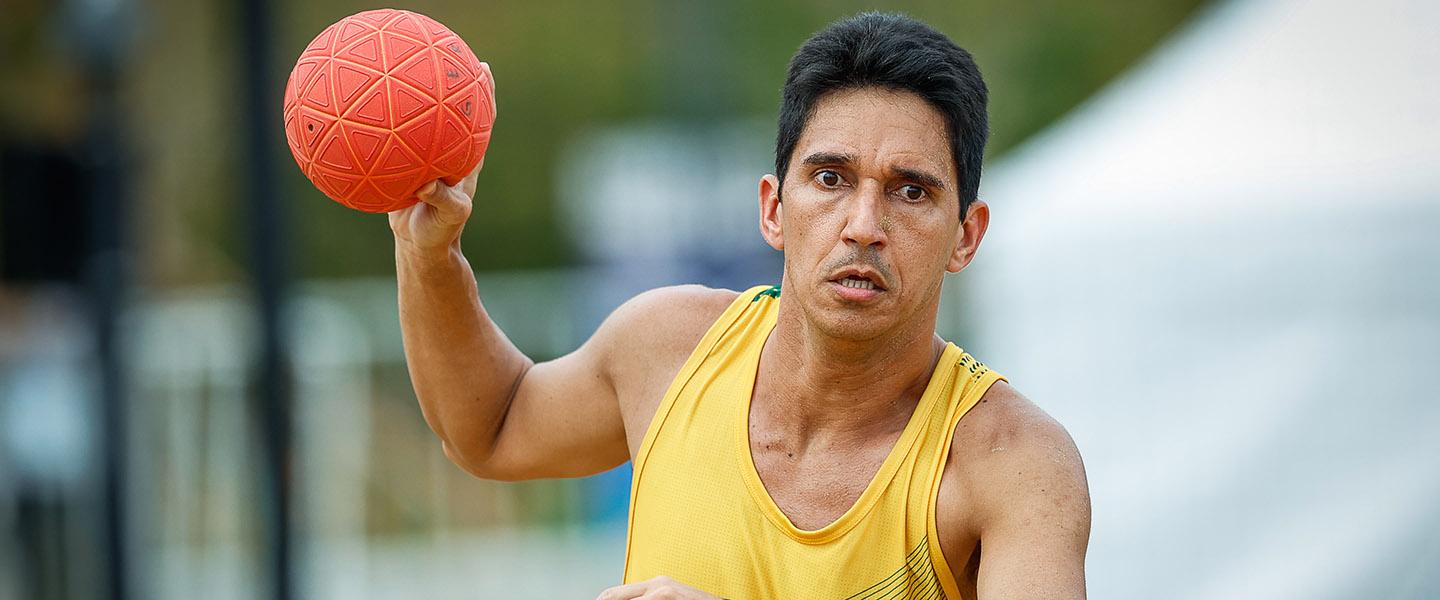
The World Games are special to Brazil’s beach handball magic maestro, Bruno Oliveira.
“2009, 2013, 2017, 2022 and 2025,” he says when asked by ihf.info about how many he has appeared in.
“Three golds”.
He says that with clear evidence of pride and happiness, but a smile is never far away from his face, his all-round positivity shining through whatever the result.
Those three golds came consecutively, in a dominant period where the Brazilians won the 2009, 2013 and 2017 editions, losing just once in 17 games stretching across an eight-year period. That loss was a 2017 defeat to Qatar in the main round, the same team which beat them in the Birmingham 2022 semi-final last time out, an event in which the South Americans still ended with a medal, bronze.
And with his side now in the quarter-finals of the 2025 edition, another medal could be on the cards again in the global, multi-sports event, one which holds fond memories for the 39-year-old for a variety of reasons.
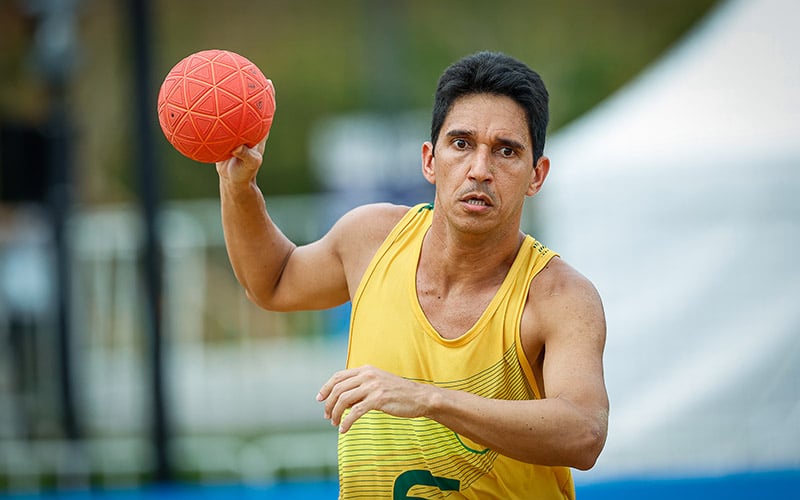
Looking back at four previous editions
“When I think of The World Games the feeling is like the first time, as every one for me is like being there for the first time. We have had so many different groups of players in the past and now, but all strong and like a family for me. I have learned so much when I live this,” says the specialist to ihf.info in the Athletes’ Village ahead of the competition starting in China.
“For me, the best game for me at The World Games was against Colombia in Colombia in Cali in 2013. It was the most people I played in front of in my career, a big crowd. I never played this before. It was so, so good, because I'm more happy to play in front of the crowd, it’s the best for me.
“My first one in 2009 was so difficult for me, because before it, in training in Sao Paulo, I had a problem in my legs, and my training was so difficult. We trained for one month as a team, but I trained just 5, 6, 7, days, but I was a young boy then. Everything was new for me. But the difference for me now from then is that I now help our young boys adapt to play as I was the youngest in the team then and today, I am more like the oldest, but to be a team leader as an older player is a pleasure for me,” he added.
“Wroclaw 2017 was more important for me personally because I played there with my wife (Juliana Oliveira –Brazilian women’s national team player) together and we won the gold medal with her. It was wonderful and at Birmingham 2022 in Alabama it was so different, because Antonio (Guerra Peixe – Brazil coach) was with the USA and to play against him was different, because he knows everything.
“If you see the game, we have a golden goal opportunity but we didn’t finish the golden goal, it was USA, then Brazil, then USA, then Brazil attacking – no-one could score the goal, but it was good because we grow up with this. Antonio is the best coach so when he got out the team, for me I didn’t understand it – it was a decision the new director made at the time – but now, he’s back, and I'm happy.
“But for me, the best thing at every The World Games is the Athletes’ Village and the athletes. This is the most important thing for me, to meet new people, and see new cultures – I have just seen the Brazil Orienteering team here and I met them three years ago at Birmingham 2022. This one is the best in history; the atmosphere, the people. It’s the best in the five The World Games I have been to. This is true.
“Sometimes, I take the medals out from a box in my room and I feel so happy, so, so good.”

A sporting evolution
Bruno made his Brazilian national team debut in 2006 and has been inextricably linked to the global development of it, winning gold in Rio de Janeiro at the 2006 IHF Men’s Beach Handball World Championships and numerous other medals, honours and accolades since.
And his history with The World Games provides a good basis to assess how he has seen the sport progress in the three decades he has been playing it.
“From 2009 to 2025, beach handball has grown up so much compared to years ago,” he said. “Today, we have Portugal, Denmark, Croatia; it is more difficult to win. You can see this in the world championship in the past, in the European Championships.
“For example, Portugal finished third in the world championship last time and sixth in Europe, Germany are European champions – more teams are at high level playing in the same conditions and this because countries see beach handball is spectacular. They see the fair play and because of this, they want to play and train more, be in more competitions. Around the world, beach handball has grown up.”
So, if the game has developed and grown, what about Bruno himself?
“No, I am not the same player from 2009,” he says matter-of-factly. “Because the sport has grown up, I have to think every time about the way I can make a difference, how to do something different – everyone watches our games and because of this I have to change my mind. 2009 to today is totally different.”
That evolution on court and off court in beach handball is nicely balanced in the Brazilian men’s team under coach Peixe, with Bruno quick to highlight the interaction between him and the coach and him and the players.
“In Brazil, we have a mentality of beach handball, and this won't change, because the sport is simple; you have four against three (in attack), so, for us, it's simple. But with the other teams watching our games so much we have to make changes to our movements and Antonio is very, very smart because he listens to all the players. It’s obvious, as he is the coach, he's decides but he listens to everyone all the time, sees it and make adaptations when he hears something good.”

‘Another place’ when on court
Anyone watching Bruno work his magic on court, whether it be an experienced beach handball follower or first-time, will see the natural flow to his movements, his head lit up by a thousand thoughts a second about where or who he can send the ball to.
And for him it is an almost out-of-body experience.
“Sometimes I’m feeling in another place. When I'm in the court, I forget everything,” explains Oliveira, who works as a lawyer for the government in his home city of Joao Pessoa in Brazil.
.
“When I'm playing, I'm feeling the crowd and the people. I'm happy when I'm playing and play feeling good. Every time I try to smile, because when you make something happy, you make it better.
“I’m a strange guy because sometimes I don't like to watch the games back. I generally only watch the matches when we lose. Sometimes I speak with my wife, my brother (Brazil women’s national team coach) and my family about the game and my wife does say ‘go and watch the game’. But with the game growing up as I said, we watch more video on our opponents now and study all the tournaments.”
Using experience to train the next generation
However, nothing beats experience in learning and Bruno, as the elder statesman of the team now finds himself working even closer with coach Peixe.
“I speak with Antonio and he talks to me all the time, saying ‘Bruno, I need to you to speak the young boys’ and asks me to talk about them doing different things in the match and the way to play’, but this is the culture in the national team in Brazil, the older players speak to the younger players.”
Those younger players are gradually replacing the older generation of Brazilians who have been a medal factory under coach Peixe. So does he ever think about hanging up his shirt and retiring?
“Sometimes, and yesterday I think about this,” he says with a calm, measured response. “When I went to the court (in Chengdu), the temperature was intense, so warm and sometimes, when I'm feeling tired, I think; ‘it's time to retire’ but I see the other guys, the young boys, and I am so tied to the team – it’s motivation.
“For example, at the 2024 IHF Beach Handball Global Tour: Finals in Doha last year I didn’t go but Aldrin Andrade (centre back, 23 years old) – the son of my first coach who is now in Portugal – played for Brazil and became Global Tour champion. Years ago, when he was a baby, I held him in my arms. When you have this connection, it is difficult to retire. I don’t know when I will, but my body is okay. [It will be] when coach says; ‘okay, Bruno, let’s call the young boys up’.”
Win or lose, happiness and positivity is key in Bruno’s philosophy
Next year will mark the 20th anniversary of his national team career with Brazil, a career he started as an 18-year-old teenager.
Throughout that time there have been many ups, but some downs too, especially in recent years, but whatever happens one things is for sure, his love and respect for the game shines through no matter what the circumstances.
“In Brazil, we have a culture that when you win the silver medal, it's not good, but you have to understand when you lose, you lose because something happened and the other side was better this day. When I lose, okay, I'm sad, but after 10, 20, 30 minutes, you have changed your mind and I’m OK, I'm happy because the other is happy too,” he explains.
“Last year, when we lose in an IHF Men’s Beach Handball World Championship in a quarter-final for the first time and I am out of the podium the first time, when they finished the tournament, at the final ceremony, I'm in the arena, seeing the group, the others player happy and in the All-star Team. I'm feeling for the others. I am sad, but feeling happy because the others win too. It is important. It’s life.
“I have a problem with football in Brazil,” he adds. “When you see the people, team against team, they are like enemies, it’s so bad. What do you want show the kids? When you teach openly to watch sports like enemies, because one colour is different to the other, there is something wrong.”
“Beach handball is my life,” he adds. “We have a culture of it in Brazil and it is different to indoor handball, not a bad difference, just different. But sports need this. When you speak with (Giampiero) Masi (IHF Beach Handball Working Group Chair), Taki (Boskoski, IHF Office Member responsible for beach handball) and the others who make it work, you know this difference.
“When you speak with the young ones about the sport you talk about that it is happy, with music; that's beach handball. When you go to the court, there is music all the time, the crowd, just everybody dancing.
“This is good, because when you make sport with entertainment it’s a perfect couple for everybody – people need to be happy when they see sport. It's not difficult to do. When you understand this, the sport is more important to the person.”


